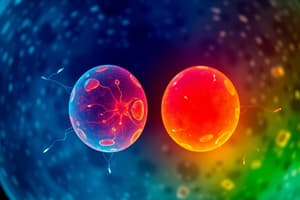Podcast
Questions and Answers
Which process involves 1 division?
Which process involves 1 division?
- Neither
- Meiosis
- Both
- Mitosis (correct)
Which process involves 2 divisions?
Which process involves 2 divisions?
- Mitosis
- Meiosis (correct)
- Neither
- Both
What type of cells are produced by mitosis?
What type of cells are produced by mitosis?
2 identical daughter cells (somatic cells)
What type of cells are produced by meiosis?
What type of cells are produced by meiosis?
Mitosis occurs in sex cells.
Mitosis occurs in sex cells.
Meiosis results in haploid cells.
Meiosis results in haploid cells.
What type of reproduction does mitosis involve?
What type of reproduction does mitosis involve?
What type of reproduction does meiosis involve?
What type of reproduction does meiosis involve?
Meiosis involves crossing over in Prophase I.
Meiosis involves crossing over in Prophase I.
Which processes start with a diploid parent cell?
Which processes start with a diploid parent cell?
Which processes involve cell division?
Which processes involve cell division?
Match the following processes with their characteristics:
Match the following processes with their characteristics:
Which processes replicate DNA?
Which processes replicate DNA?
Which processes involve Interphase (once)?
Which processes involve Interphase (once)?
Which processes consist of Prophase, Metaphase, Anaphase, and Telophase?
Which processes consist of Prophase, Metaphase, Anaphase, and Telophase?
Flashcards are hidden until you start studying
Study Notes
Mitosis
- Involves a single division of the cell.
- Results in two identical daughter cells, which are somatic cells.
- Occurs in body cells, contributing to growth, repair, and asexual reproduction.
- Produces diploid (2n) cells containing 46 chromosomes in humans.
- Replicates DNA before division to ensure each daughter cell has complete genetic information.
- Follows a sequential process: Prophase, Metaphase, Anaphase, and Telophase.
- Interphase occurs once before the division begins.
Meiosis
- Consists of two divisions, resulting in four non-identical daughter cells.
- Crucial for producing gametes (sex cells) involved in sexual reproduction.
- Creates haploid cells with 23 chromosomes, half the number of diploid cells.
- Features genetic variation through processes such as crossing over during Prophase I.
- Includes homologous pairing of chromosomes, enhancing genetic diversity.
- Starts with a diploid parent cell, similar to mitosis but diverges in division outcomes.
- Shares the same initial phases: Prophase, Metaphase, Anaphase, and Telophase, each adapted for meiosis.
- Interphase occurs once before both divisions, allowing for DNA replication.
Common Traits of Mitosis and Meiosis
- Both processes initiate from a diploid parent cell.
- Involve the fundamental mechanism of cell division.
- Each process requires the replication of DNA prior to division.
- Follow the same sequence of phases: Prophase, Metaphase, Anaphase, and Telophase.
Studying That Suits You
Use AI to generate personalized quizzes and flashcards to suit your learning preferences.




